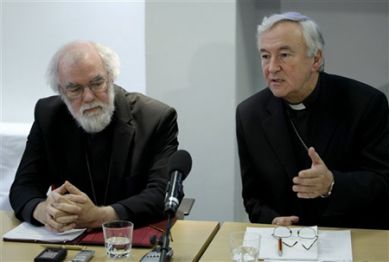Vatican Announces New Provisions For Anglican Converts

The Catholic Church announced on Tuesday that it has made official provisions for allowing Anglicans into the church while retaining parts of their liturgical heritage.
A response to "many requests" from Anglicans who have shown interest in converting to Catholicism, Cardinal William Levada, prefect of the Congregation for the Doctrine of Faith, told BBC that the new Apostolic Constitution provides, "a reasonable and even necessary response to a worldwide phenomenon."
"Those Anglicans who have approached the Holy See have made clear their desire for full, visible unity in the one, holy, catholic and apostolic Church," Levada said. "At the same time, they have told us of the importance of their Anglican traditions of spirituality and worship for their faith journey."
One group, known as the Traditional Anglican Communion, has made their intentions to join the Catholic Church public. The group, which split from the Archbishop of Canterbury in 1990, claims to hold a membership of 400,000 in 41 countries.
According to the new structure, Anglicans who choose to join the Catholic Church will be grouped in special entities called personal ordinariates, which will be headed by former Anglican clergy. The units are modeled after Catholic military ordinariates, which are special groups that provide spiritual care for members of the armed forces and their families
Other tenants of the provision include allowing married Anglican priests and seminarians to become ordained Catholic priests, although not bishops, and allowing the use of Anglican prayer books.
A joint statement issued by the Archbishop of Westminster and the Archbishop of Canterbury credited the constitution as being an achievement between the groups, and a result of over 40 years of ecumenical dialogue.
The Apostolic Constitution, "brings to an end a period of uncertainty for such groups who have nurtured hopes of new ways of embracing unity with the Catholic Church," the statement reads, and, "is further recognition of the substantial overlap in faith, doctrine and spirituality between the Catholic Church and the Anglican tradition."
"With God's grace and prayer we are determined that our on-going mutual commitment and consultation on these and other matters should continue to be strengthened," it says.
"This close cooperation will continue as we grow together in unity and mission, in witness to the Gospel in our country, and in the Church at large."
Rather than an ecumenical victory, however, some have seen the constitution as a Catholic maneuver to win new converts from the Anglican Church, which has suffered serious division over issues including homosexuality and the role of women in the church.
"The two questions I would want to ask are 'why this and why now,'" representative for the Anglican Church in Rome the Very Rev. David Richardson told The Associated Press. "Why the Congregation for the Doctrine of the Faith has decided to embrace that particular method remains unclear to me."
"If it's for former Anglicans, then it's not about our present difficulties, then it's people who have already left," he said. "There is in my mind an uncertainty for whom it is intended."
Rejecting the idea of Catholic poaching, Anglican head Dr. Rowan Williams said during a press briefing in London that, "[The Apostolic Constitution] is a response to this range of requests and inquiries from a very broad variety of people, either Anglican or of Anglican heritage, in that sense it has no negative impact on the relations of the communion as a whole to the Roman Catholic church as a whole."
"I do not think this constitution will be seen as in any sense a commentary on Anglican problems offered by the Vatican," Williams said.